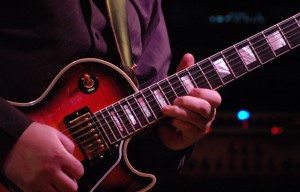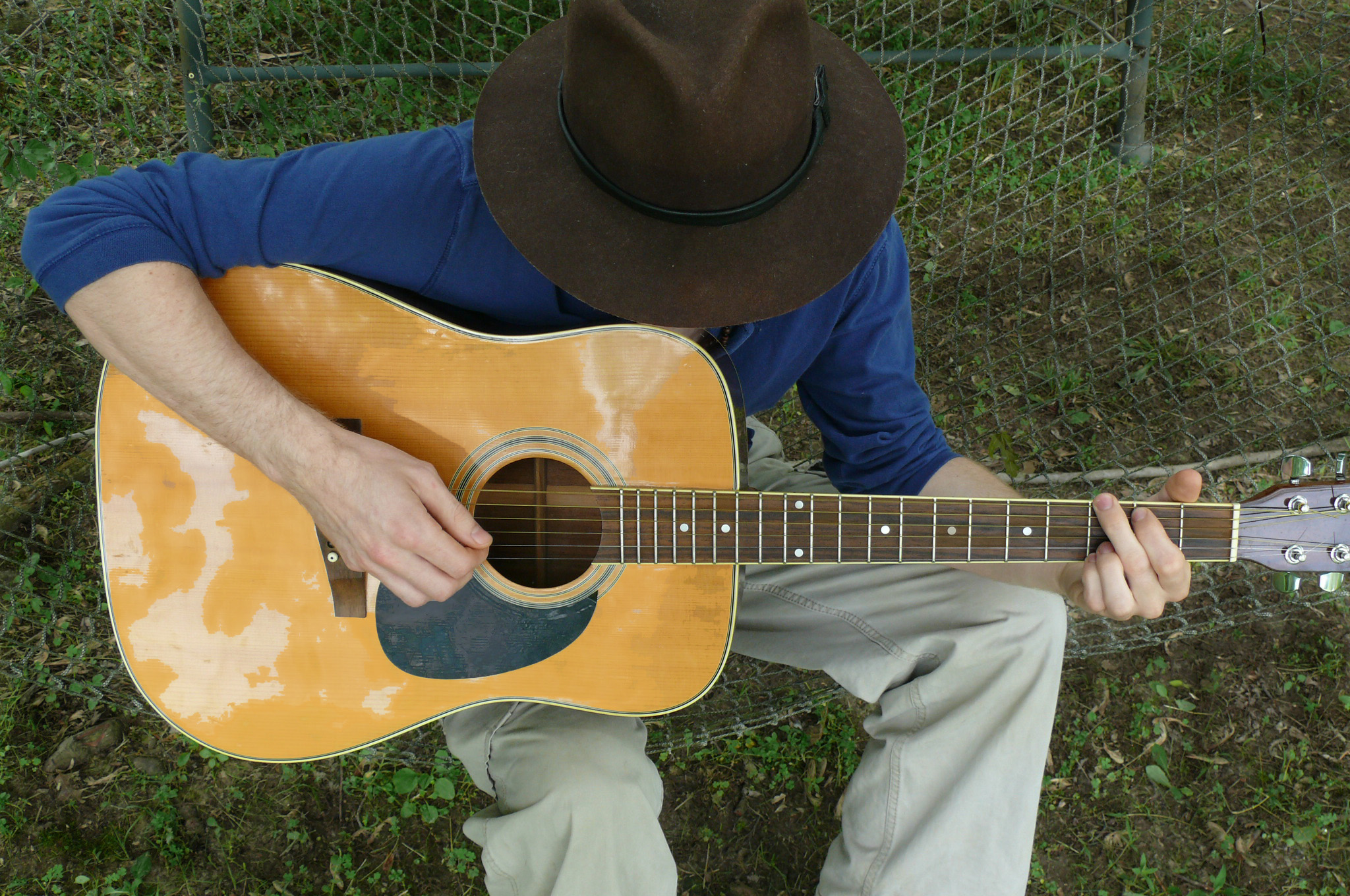If you’ve never taken guitar or other music lessons before, you may have some questions about what’s important, what to expect, and how fast you’ll make progress. Here are some common questions and answers.
What do you teach?
Instruments: Acoustic and electric guitar, as well as beginning ukulele and mandolin.
Styles: Primarily rock, pop, blues, folk, metal, country, and jazz.
Is it okay to “try out” guitar lessons?
Certainly. If you haven’t taken lessons before, I recommend taking at least 4 to really see what the experience is like.
I (or my child) have no music experience. Can I still learn guitar?
Absolutely! Every master guitarist started exactly where you are!
Am I to old/young to learn guitar?
There are no age limitations with music, and I’ve taught students from 3 to 82 how to play guitar proficiently and confidently. I typically teach students 5-adult in person, and 10-adult on Skype.
What if I’m tone deaf?
Actual tone deafness is extremely rare. If you can enjoy listening to music, you can learn to create beautiful music.
Does it matter if I can’t read music?
Nope. Most guitarists use a simpler system called guitar tablature, which takes about 30 seconds to understand. I do teach music reading as well to those who can use it to reach their personal music goals.
Can I play guitar if I have an injury/disability?
There’s only one way to find out. Several famous and influential guitarists played despite injuries or handicaps. Django Reinhardt played his most influential and remembered music after an injury left two of his fretting-hand fingers paralyzed. Tommy Iommi of Black Sabbath lost the tips of two fretting fingers in an accident prior to becoming famous.
I used to think you needed two arms and hands to play the guitar, but discovered that I was entirely wrong after seeing the inspirational Mark Goffeney. Check out Mark in action here.
Someone told me I’m not talented or musical…
Unfortunately, sometimes we come across someone who says something that crushes our self esteem, or makes us believe that we are limited in some way. There are many reasons why people say these things, but 99% of the time they actually have nothing to do with you or your ability, and everything to do with the person who said it and his or her outlook.
Long story short: It’s overwhelmingly likely that they’re wrong. A bad experience or two with music doesn’t mean anything, and most of us have had them at some point. Even a seasoned musical professional can’t give you any kind of guarantee or scientific certainty that you are “bad at music”. Chances are, they just aren’t flexible enough to teach you.
Give it a go. Few feelings compare to the one you get when you prove doubters wrong.
Does playing guitar hurt your fingers?
The bad news is that sore fingers go with the territory when learning guitar. The good news is that if you persevere for a few days up to a couple of weeks of regular playing, your body will adapt on its own.
The skin on your fingertips will becoming tougher and stronger. After that, pain is very rare, unless you suddenly and dramatically increase the intensity or duration of your playing. Even then, your body adjusts. Perseverance pays off!
Do I need to have my own guitar?
In order to improve, you need to spend time practicing and playing on your own, and therefore you need to have regular access to a guitar. So beg, borrow or buy. Guitars can be found at low enough prices that renting makes little sense.
If you’re watching your budget, you can find a number of great guitars that are attractive, highly playable, and great sounding for under $200, and there are even options under $100 that are surprisingly good.
If you’re not sure whether you’ll keep playing the guitar, another option is to buy a used guitar in good condition on eBay, use it for a short period of time (taking care not to damage it) and, if you so choose, re-selling it at practically the same price, as long as the condition is the same.
What type of guitar should I get?
This depends on your taste in music more than anything else. If you want to play Joan Baez songs, you’ll likely want a different guitar than if your favorite band is Metallica.
To start, check out the songs you’d like to learn to play. Are most of them on an acoustic or electric guitar? Nylon or steel string? Perhaps you don’t know, in which case it’s a great idea to go down to your local guitar shop and ask some helpful guitar mavens working there.
Unless you’re a collector, I’d recommend not getting an incredibly expensive first guitar. There are plenty of good affordable guitars out there, and you can always buy a more expensive one when you’re sure you’re going to keep playing, and know enough about guitars to know what you really want.
Should I get anything other than a guitar?
Depending on what style you want to play, it may be helpful to get some picks, fingerpicks, a bottleneck slide, footrest, and/or a capo. If you’re unsure which you’ll need, I’m happy to offer suggestions.
Three items I would definitely recommend are an electronic tuner or tuning app, extra strings, and wire cutters for changing strings. You may also want to consider getting a protective case for you guitar if you don’t already have one.
Can I take guitar lessons with friend or relative?
Absolutely. Taking guitar lessons with a friend or loved one gives you someone to learn, troubleshoot, and jam with, and can be incredibly motivating.
I also offer discounts for friends, family, and couples who take lessons together.
If you’re interested in organizing a joint or group lesson, simply contact me with your request.
How long does it take to get good?
A complete beginner who puts in regular practice can start playing pieces very well within just a few weeks, and can play beautifully within a few months.
What’s the fastest way to improve?
Having specific goals, and balanced, varied practice! It’s easy to improve rapidly once you plot a course for yourself and make practicing a habit.
How frequently should I take lessons?
This is entirely up to you, but for most students I recommend starting with 30-minute lessons. For most people, this is a good amount of time.
If you are champing at the bit for more guitar, and want to improve even faster, it’s easy to switch to 60-minute lessons or the slightly more effective two 30-minute lessons per week. Two 60-minute lessons is only recommended for extremely serious and motivated students.
How much should I practice?
Frequency is more important than duration. It’s better to practice 10 minutes each day for 7 days, than to play for 70 minutes one day a week. You’re also much more likely to practice if you make it an easy and rewarding habit!
How can I make practicing more fun?
Most often we make practicing “work” rather than fun. Remember, fun is priority #1.
Try committing to practicing for just 10 minutes a day to start. Make it a ritual. Practicing right before or after an established habit like a daily meal, or going to/coming home from work or school, will make it much easier to do automatically.
As with a healthy dinner, I recommend taking care of your exercises (the veggies) first, and then rewarding yourself with your favorite stuff (dessert!)
I’m super busy and not sure I’ll have time to practice…
Have you ever heard the adage: If you want something to get done, ask a busy person to do it? Most of the time, even when we’re incredibly busy, we really do have time to fit in other things if they are high enough of a priority to us.
Do you really not have 15min free each day? If the answer is no, realize that without time to practice, your progress will be much slower. But more likely you’ll be able to make it work.
Here are a few tips to make it easier:
1. Take a few minutes to practice before or after an already established routine, such as going to or coming home from work or school or before or after a meal.
2. Take your guitar with you. Perhaps you’ll have a few free minutes at lunch or a break.
3. Set a reminder, and commit to making the guitar a priority for a certain period of time (perhaps a month). Chances are you won’t have to sacrifice much for it.
I feel “stuck” in my guitar playing/songwriting. Can you help me?
If you feel “stuck”, chances are you need to shake up your practicing and playing routine. I’m happy to help if you fall into this category.
For both playing and songwriting, I use a number of creativity exercises I’ve collected (from both my music and writing careers) that can help you start producing an abundance of new material immediately.
Do I have to learn lots of scales and exercises and boring stuff?
Some students have goals that don’t require knowing too much theory, and that’s fine. That said, music theory let’s you do so much more, and it actually makes things much easier in the long run.
I use a number of games and strategies to make theory more fun and useful to learn, if you want to amp up your playing and songwriting abilities.
I have a very specific goal, can you help me?
Many of my students have one or more specific goals, and they are all slightly different. That said, I of course don’t specialize in everything (that wouldn’t be specializing, would it?). If you’re interested in reaching a specific goal or goals, contact me and we can decide if it’s a good match.
Can you recommend a good guitar for me or my child?
Definitely. Email or call me, and I’ll ask you a few questions to help determine the best guitar for you or the person you’d like to buy one for.
Can you recommend a good webcam?
Yes. On my website you can find links to reviews of the top webcams available.
I have a question that wasn’t answered here…
No problem. You can email your question to me personally at , or call (415) 246-9167. More FAQs can also be found at www.CreativeSparkGuitar.com.


